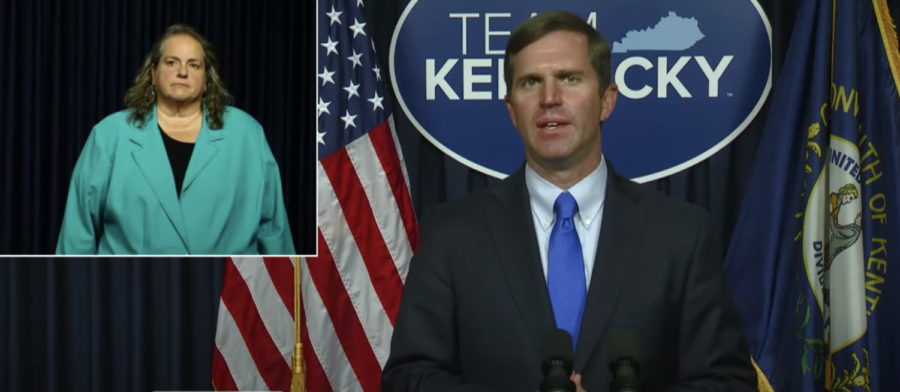Virginia Moore, ASL interpreter, speaks to UK students
Virginia Moore, director of the Kentucky Commission on the Deaf and Hard of Hearing, waits for Gov. Andy Beshear to begin his remarks so that she can interpret them to the audience during his address to Kentuckians on Sept. 10, 2020.
October 2, 2020
You might have seen her on television, or scattered across your social media feed; maybe you saw her bobblehead, or you heard her mentioned on “Last Week Tonight” with John Oliver.
She’s Virginia Moore, the executive director of the Kentucky Commission on the Deaf and Hard of Hearing (KCDHH) who became a household name and face in Kentucky after she began as the American Sign Language interpreter during Gov. Andy Beshear’s COVID-19 press conferences.
UK’s Lewis Honors College hosted a virtual discussion with Moore last Tuesday, where she shared her experiences and how she joined Team Kentucky’s near-daily briefing.
Moore was born to deaf parents and grew up with two deaf siblings and two hearing siblings besides herself. Despite her upbringing, Moore said that interpretation wasn’t her first career choice.
“It was a path chosen for me, but not one that I paid attention to until later in my career, but one that I am thrilled that I did pay attention. We don’t always pay attention to what is ahead of us. Sometimes we think we know where we’re going and all of a sudden it works its way out, and here I am,” said Moore, who started college as a criminology major.
Now, 25 years since she first joined KCDHH, Moore is one of the most well-known ASL interpreters because of what she called her “15-minutes of fame, even though that was about an hour ago” for interpreting the governor’s COVID-19 updates.
Bobble-head figurines of her were made, as was an ice cream flavor with Moore as the namesake. John Oliver said to “gif that woman immediately” after sharing a short clip of Moore’s empathetic facial expressions during a presser in March. Her image quickly spread across the internet, to the point where Moore has little anonymity in public anymore. Through all the attention, Moore has become a key figure in Kentucky’s fight against COVID-19, especially for the deaf and hard of hearing community.
When COVID-19 began, Moore reached out to Gov. Andy Beshear’s office to discuss the need for ASL interpreters at press conferences, and it only took one phone call for him to agree.
“We talked and he said ‘come on in and share the stage’,” Moore said. “This governor has allowed this type of access, and this access has allowed everyone to be more conscientious of providing their information.”
Moore said after officials saw her interpreting at the COVID-19 press conferences, even the local government started taking notice of the need for ASL interpretation, such as when Louisville officials requested an ASL interpreter for press conferences on the Breonna Taylor case.
Moore said she is happy her work has started to raise awareness for the deaf and hard of hearing community, but there is a lot of work left to be done. One specific thing Moore has worked on is encouraging news stations to caption their news and weather so that the deaf and hard of hearing community can get the information they need from that source.
“I helped and wrote a letter to all of the networks. They pushed it out to encourage them to now caption everything. Most all of the networks, now there are a couple in western Kentucky, we’re trying to push are captioning all of their news channels and some of their weather channels,” Moore said. “It’s costly for them to caption, so we’re trying to encourage them to get a sponsor.”
Moore’s work has also allowed her to help the deaf and hard of hearing overcome some of the challenges specific to COVID-19, such as lip-reading and muffled words in a world of face masks.
“I worked hard to get some funding to provide clear masks,” Moore said. “You are still covered. It is professional. Dr. Stack and I worked together on it.”
Moore said despite raising awareness and making changes because of her newfound fame, she is just happy that it gives her the chance to educate others about the deaf and hard of hearing community.
“People came up to me and wanted selfies. I don’t get it. I don’t understand. What I do appreciate is the fact that they do follow-up with ‘oh my gosh, it’s Virginia, now you provide sign language interpreting’, and I can educate them for a little bit along the way, so that’s a good thing,” Moore said.
Moore said those who wish to educate themselves more on ASL language and culture and have an affinity for language should feel free to.
“I would highly recommend it if you can take a class in ASL to understand the culture. If you are going into a field, like a medical field or to be a counselor or a mental health provider or whatever, those are great fields, continue to do that, but learn a little but about deaf culture,” Moore said.
Moore ended the discussion by encouraging those who may need KCDHH resources to reach out.
“Helen Keller was asked, if she had a choice of being deaf or blind, which would she choose? She said, ‘I would choose to be blind, not deaf, because blindness separates me from objects. Deafness separates me from people’,” Moore said. “I think that is very important, I think that is something that we all need to know. Reach out to us for resources to connect you with somebody else. If we can’t help you, we will get you in contact with someone.”
More information on the KCDHH resources available visit https://www.kcdhh.ky.gov/.
Tune in daily Monday to Thursday at 4 p.m. to watch Moore during Gov. Andy Beshear’s COVID-19 press conferences.
































































































































































